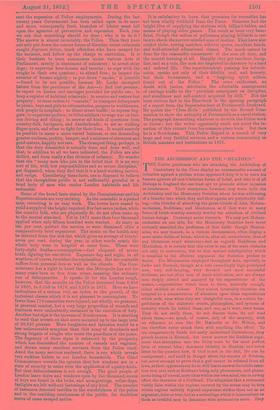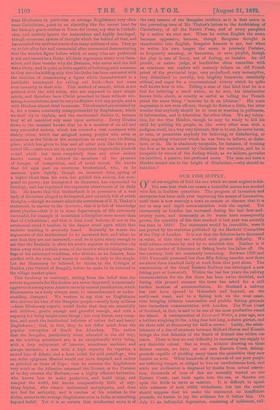THE ARCHBISHOP AND THE " HEA.THEN."
HE Native gentlemen who are attacking the Archbishop of Canterbury in the Times display an unreasonable amount of irritation against a prelate whose appointed duty it is to warn his hearers against all non-Christian forms of belief, and who is of all Bishops in England the one least apt to promote either injustice or intolerance. Their annoyance, however, may warn both the Archbishop and the Missionary Societies whom he was addressing of a blunder into which they and their agents are perpetually fall- ing,—the blunder of attacking the great Creeds of Asia, Moham- medanism, Buddhism, and Hindooism, as if they were so many forms of fetish-worship scarcely worthy the attention of civilised human beings. Contempt never converts. We may put Moham- medanism on one side, for the Missionary Societies have never seriously assaulted the professors of that faith- though Mission- aries, we may remark, as a curious circumstance, often display a more acute dislike of Islam, which is, after all, monotheism, than of any idolatrous creed whatever—but as regards Buddhism and Hindooism, it is certain that this error is one of the main obstacles not only to conversion, but to that mutual intelligibility which is essential to the effective argument the Societies profess to desire. The Missionaries employed throughout Asia, especially in India and Buranah, though as a rule exceedingly high-principled men, very self-denying, very devoted and most successful civilizers, are not often men of much cultivation, and are always men deeply stirred and annoyed by the superstitions of the masses,—superatitions which seem to them, naturally enough, either childish or vicious. They almost invariably therefore are tempted to a concentration of attention upon these superstitions which ends, even when they are thoughtful men, in a certain for- getfulness of the elaborate creeds, philosophies, and systems of morality which lie behind them, and are, as it were, their bones. They do not study them, do not discuss them, do not read about them,—we speak, of course, only of the majority, with no reference to men like Dr. limberlin or Dr. Wilson, and can therefore never attack them with anything like effect. To use comparatively feeble but easily understood illustrations, they preach heaven in Burmah, but never answer the Buddhist argu- ment that absorption into the Deity must be the most perfect form of eternal bliss ; denounce idolatry in Bombay, and never listen to the question how, if God is not in the idol, He can be omnipresent ; and scold in Bengal about the amours of Krishna, but never attempt to prove that a god cannot be released from all laws, as their opponents say he is; still less to answer the subtle asser- tion that acts such as Krishna's being only phenomena, and pheno- mena being all unreal, mere ideas within our own mind, can in noway affect the character of a Godhead. The allegation that a statement visibly false within the regions covered by the senses may be true within regions entirely beyond experience strikes them not as an argument, false or true, but as a subterfuge which it is incumbent on them as truthful men to denounce with acrimonious scorn. They
treat Hindooism in particular as average Englishmen very often treat Catholicism, point to an absurdity like the recent hunt for the Bishop's grave-clothes in Torre del Greco, say that is Catholi- cism, and entirely ignore the harmonious and highly developed, though erroneous, system of thought which lies behind all that, and has satisfied the spiritual wants of so many millions of men. They go on at fair after fair and ceremonial after ceremonial demonstrating that the wooden figure before which so many rites are performed Is not and cannot be a Deity, till their arguments weary even them- selves, and then wonder why the Brahmin, who never said the doll was a Deity, and is quite as little capable of believing such nonsense as they are—he holding only that his Order has been entrusted with the function of consecrating a figure which thenceforward is a justifiable instrument for calling out faith—does not come over instantly to their side. This method of assault, which is not pursued with the wild tribes, who are supposed to have simple minds, and therefore have Christ preached to them without irri- tating denunciations, must be very ineffective with any people, and is with Hindoos almost fatal to success. The educated are irritated by it, for a reason constantly misapprehended by Englishmen, which we shall try to explain, and the uneducated disdain it, because they of all mankind rely most upon authority. Every Hindoo down to the meanest knows that he is a member of an old and very successful society, which has covered a vast continent with stately cities, which has assigned among peoples who seem as numerous as the birds or the mosquitoes to every man his fitting place, which has given to him and all other men like him a pro- tected life—caste-men are in many important respects like kinsfolk —and which has more completely than any other society known among men relieved its members of the pressure of hunger, of competition, and of social unrest. He knows that for ages past an enormous brotherhood, who, as be assumes quite rightly, though on incorrect data, spring of a higher blood than his own, has guided this society', has com- posed its poetry, has interpreted its literature, has expounded its theology, and has regulated the expiatory observances of its daily life. He knows that this brotherhood is in possession of a vast body of literature alleged to be inspired, and certainly full of subtle thought,—though we cannot admit the correctness of S. B. Thakur's statement, in answer to the Spectator, that it is full of knowledge about physics—that it is in some departments of life extremely successful, for example it maintains a discipline more severe than that of Catholicism ; and that it does itself believe, if not in the ceremonial creed it teaches, in the deeper creed upon which that exoteric teaching is avowedly based. Naturally he wants the arguments of this brotherhood to be answered first, and when he sees that they are not answered,—and he is quite sharp enough to nee that the Brahmin is often his rival's superior in dialectics—he turns away with a certain scorn of the teacher who is taking advan- tage of his unlearned condition, who shrinks, as he fancies, from conflict with the wise, and wants to confine it only to the simple. Let the Missionary be believed, he thinks, in the Colleges of Nuddea (the Oxford of Bengal), before he seeks to be believed in the village market-place.
This tendency to contempt, arising from the belief that the serious arguments for Hindooism are never disproved, is immensely aggravated among some Asiatics races by mental peculiarities, which Missionaries as a body always seem to misunderstand, or under- standing, disregard. We venture to say that no Englishman who derives his idea of the Bengalee people—nearly forty millions —from Missionary reports, would doubt that they are essentially evil children, gentle enough and graceful enough, and with a capacity for being taught some things ; but very literal, very recep- tive, and much the intellectual inferiors of rather dull and heavy Englishmen ; that, in fact, they do not differ much from the popular conception of South Sea Islanders. The notion that the Bengalee, particularly when educated in the old way, as the working priesthood are, is an exceptionally witty being, with a deep enjoyment of humour, sometimes sardonic and always sarcastic ; a man with a high capacity for repartee, a rooted love of debate, and a keen relish for acid persiflage ; who can write epigrams Martial would not have despised, and satires as polished as those of Pope ; that he esteems the Englishman very much as the Athenian esteemed the Roman, or the Parisian of to-day esteems the Berliner,—as a highly efficient barbarian, who knows how to make penknives, and build ships, and conquer the world, but knows comparatively little of any- thing higher, who cannot understand metaphysics, and does not feel for antiquity, and is careless of his relation to the divine, seems to the average Englishman even in India as something beyond belief. Yet it is as certain that intellectual scorn is of the very essence of the Bengalee intellect, as it is that scorn is the pervading tone of Mr. Thakur's letters to the Archbishop of Canterbury, of all the Native Press, and of every pamphlet by a native we ever saw. When he writes English the scorn becomes oppressive, because, though Bengalee thought is transferable into English, Bengalee humour is not, but when he writes his own tongue the scorn is precisely Parisian, as frequently amusing, or humorous, or even playful, though the play is one of fancy, not of feeling, as incisive. An old pundit, or native judge, or landholder often resembles with an exactness our readers will scarcely believe an old French priest of the provincial type, very prejudiced, very unreceptive, very disinclined to novelty, but brightly humorous, essentially critical, and eager for a conversational victory which he quite well knows how to win. Telling a man of that kind that he is a fool for believing a creed which, as he sees, his interlocutor knows little about, is exactly as useful as telling the French priest the same thing "because he is an idolater." His main impression is not even offence, though he flushes a little, but utter wonder that anybody should be at once so wanting in politeness, in information, and in toleration for other ideas. We say tolera- tion, for the true Hindoo, though he may be ready to kill his child for quitting his people, is, like every other man with a pedigree creed, in a way very tolerant, that is to say, he never hates, or cuts, or persecutes anybody for believing, or disbelieving, or doing anything whatever which he was born to believe, or disbe- lieve, or do. He is absolutely incapable, for instance, of treating the Jew as he was treated by Christians for centuries, and he is incapable by reason of the feeling which, as we believe, pervades his intellect, a passive, but profound scorn. The man not born a Hindoo cannot rise to the height of Hindooism,—why should he hate him ?



































 Previous page
Previous page